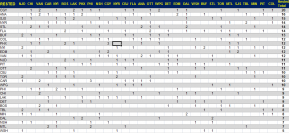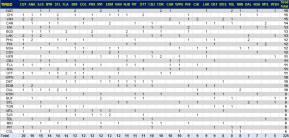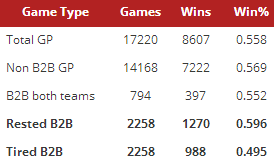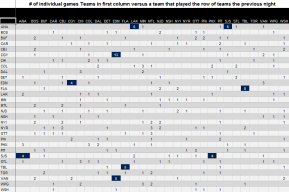Continuing the tradition, this is the annual back-to-back breakdown the NHL schedule between rested and tired teams. The 2013-14 version features an NHL post-lockout #1 record based around the Battle of Alberta .. sort of. I won't get into the heavy details here simply I'll just try to present breakdown by teams.
I’ve written about this extensively in the past including effects and impact on NHL realignment.
The underlying data is in a google doc here. There are three tabs in the document that correlate to the information described below.
The definitions are below.
- Rested – team that has not played the previous night facing a team in the second night of a back-to-back set on consecutive nights.
- Tired – a team playing its second game on consecutive nights versus a team that is rested and not played the previous night.
This season's leader is the Calgary Flames, with 20 games as a rested team. We’ll explore in a little more detail just a little further down the post the interesting little twist.
Divisional rivals Anaheim and San Jose rank second and third. Rounding out the bottom of the list is Washington with five games as a rested team, followed by Montréal, Nashville and Dallas (7).
In total, 325 games played features a rested versus tired team making up a slight uptick over 25% of the schedule.
Turning our attention to the other end, the New Jersey Devils lead the league with 16 games as a tired team. The Vancouver Canucks and defending Stanley Cup champions Chicago Blackhawks are tied for second with 15. Taken at the bottom is the Colorado Avalanche with six, followed by a four way tie between Pittsburgh, Minnesota, Tampa Bay and San Jose.
Over the entire spectrum of the NHL the average amount of games as a rested team is 10.8 meaning Calgary doubles the NHL average with 20.
NHL realignment missed the divisional impact to teams where an opponent would be traveling through an area, let's say Alberta, playing the Edmonton – Calgary or vice versa combination, effectively giving the team playing the first night a disadvantage over the team that's playing on the second night.
Rested teams have a tendency to win at about 0.596% clip.
Alberta's Dirty Little Secret
The Calgary Flames in 2013-14 are beneficiaries of a number of teams traveling through Edmonton first on the first night of a back-to-back and then skipping right over to Calgary for the second game in two nights.
Of the 20 games as a rested team, 13 feature a team that played Edmonton the night before - representing a new NHL post-lockout record. Five of those individual instances involve a divisional rival. Only four teams end up playing Calgary and then traveling to Edmonton, causing this to be one of the greatest imbalances perhaps even in the post-lockout NHL and a cause of concern especially with a different playoff format.
To put that into context how high 13 games really is, Edmonton on night one and Calgary on night two combination has occurred 28 times in the 6-year span between the lockouts not including the lockout shortened season of 2012-13.
Those 13 games represent slightly less than 50% of the total amount of games spanning six seasons. Reversing the combination produces 37 total games representing 35% of the six season total where Edmonton has the advantage of being a team on the second night.
Edmonton has led this category three times (Tied with Anaheim in ’11-12) over the six season span with the LA Kings leading twice – both instances in double digits, both against the Anaheim Ducks. LA had the previous high of 12 games in the 2008-09 season.
Now, one could try to make a case and justify this from a scheduling perspective that Calgary is in a position where they're trying to rebuild and the outcome here really doesn't matter. From a more sinister perspective, perhaps the schedule makers considered the impact it could have on Edmonton making the playoffs and tipping the scales to the team that isn’t as likely to be involved in the playoff race.
The situation could become very different if Calgary was to somehow make a run. Edmonton is already on the bubble to make the dance in Spring 2014 and it’s not like they need added divisional pressure. This is also an issue to monitor moving forward.
Florida and Tampa Bay have a similar back-and-forth, historically and that trend continues in 2013-14. Florida faces a team on the second night of a back-to-back after they've played Tampa Bay the previous night. That's three times less than the five teams that travel to Tampa Bay after playing Florida the previous night.
In general the Pacific division is affected most. In fact the Florida teams are the only others outside of the Pacific that feature this combination of teams playing through divisional rivals over three times.
Congratulations to the Flames setting records before the season even began.
Follow the McKeen's team on Twitter:
@KatsHockey
@mckeenshockey



































